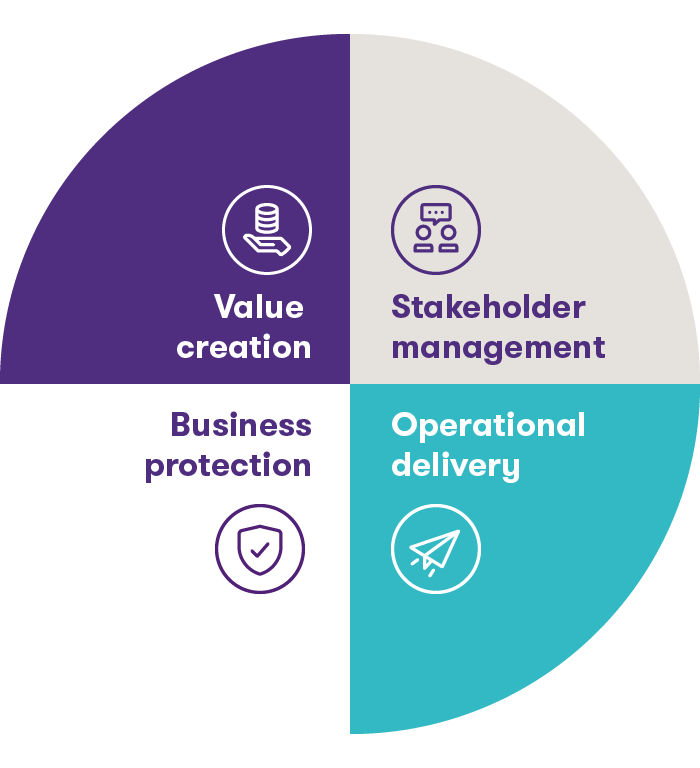-
Audit approach overview
Our audit approach will allow our client's accounting personnel to make the maximum contribution to the audit effort without compromising their ongoing responsibilities
-
Annual and short period audit
At P&A Grant Thornton, we provide annual and short period financial statement audit services that go beyond the normal expectations of our clients. We believe strongly that our best work comes from combining outstanding technical expertise, knowledge and ability with exceptional client-focused service.
-
Review engagement
A review involves limited investigation with a narrower scope than an audit, and is undertaken for the purpose of providing limited assurance that the management’s representations are in accordance with identified financial reporting standards. Our professionals recognize that in order to conduct a quality financial statement review, it is important to look beyond the accounting entries to the underlying activities and operations that give rise to them.
-
Other Related Services
We make it a point to keep our clients abreast of the developments and updates relating to the growing complexities in the accounting world. We offer seminars and trainings on audit- and tax-related matters, such as updates on Accounting Standards, new pronouncements and Bureau of Internal Revenue (BIR) issuances, as well as other developments that affect our clients’ businesses.
-
Tax advisory
With our knowledge of tax laws and audit procedures, we help safeguard the substantive and procedural rights of taxpayers and prevent unwarranted assessments.
-
Tax compliance
We aim to minimize the impact of taxation, enabling you to maximize your potential savings and to expand your business.
-
Corporate services
For clients that want to do business in the Philippines, we assist in determining the appropriate and tax-efficient operating business or investment vehicle and structure to address the objectives of the investor, as well as related incorporation issues.
-
Tax education and advocacy
Our advocacy work focuses on clarifying the interpretation of laws and regulations, suggesting measures to increasingly ease tax compliance, and protecting taxpayer’s rights.
-
Business risk services
Our business risk services cover a wide range of solutions that assist you in identifying, addressing and monitoring risks in your business. Such solutions include external quality assessments of your Internal Audit activities' conformance with standards as well as evaluating its readiness for such an external assessment.
-
Business consulting services
Our business consulting services are aimed at addressing concerns in your operations, processes and systems. Using our extensive knowledge of various industries, we can take a close look at your business processes as we create solutions that can help you mitigate risks to meet your objectives, promote efficiency, and beef up controls.
-
Transaction services
Transaction advisory includes all of our services specifically directed at assisting in investment, mergers and acquisitions, and financing transactions between and among businesses, lenders and governments. Such services include, among others, due diligence reviews, project feasibility studies, financial modelling, model audits and valuation.
-
Forensic advisory
Our forensic advisory services include assessing your vulnerability to fraud and identifying fraud risk factors, and recommending practical solutions to eliminate the gaps. We also provide investigative services to detect and quantify fraud and corruption and to trace assets and data that may have been lost in a fraud event.
-
Cyber advisory
Our focus is to help you identify and manage the cyber risks you might be facing within your organization. Our team can provide detailed, actionable insight that incorporates industry best practices and standards to strengthen your cybersecurity position and help you make informed decisions.
-
ProActive Hotline
Providing support in preventing and detecting fraud by creating a safe and secure whistleblowing system to promote integrity and honesty in the organisation.
-
Sustainability
At P&A Grant Thornton sustainability is at the core of our mission. We are committed to fostering a healthier planet through innovative practices that reduce our environmental footprint, promote social responsibility, and ensure economic viability for future generations.
-
Accounting services
At P&A Grant Thornton, we handle accounting services for several companies from a wide range of industries. Our approach is highly flexible. You may opt to outsource all your accounting functions, or pass on to us choice activities.
-
Staff augmentation services
We offer Staff Augmentation services where our staff, under the direction and supervision of the company’s officers, perform accounting and accounting-related work.
-
Payroll Processing
Payroll processing services are provided by P&A Grant Thornton Outsourcing Inc. More and more companies are beginning to realize the benefits of outsourcing their noncore activities, and the first to be outsourced is usually the payroll function. Payroll is easy to carve out from the rest of the business since it is usually independent of the other activities or functions within the Accounting Department.
-
Our values
Grant Thornton prides itself on being a values-driven organisation and we have more than 38,500 people in over 130 countries who are passionately committed to these values.
-
Global culture
Our people tell us that our global culture is one of the biggest attractions of a career with Grant Thornton.
-
Learning & development
At Grant Thornton we believe learning and development opportunities allow you to perform at your best every day. And when you are at your best, we are the best at serving our clients
-
Global talent mobility
One of the biggest attractions of a career with Grant Thornton is the opportunity to work on cross-border projects all over the world.
-
Diversity
Diversity helps us meet the demands of a changing world. We value the fact that our people come from all walks of life and that this diversity of experience and perspective makes our organisation stronger as a result.
-
In the community
Many Grant Thornton member firms provide a range of inspirational and generous services to the communities they serve.
-
Behind the Numbers: People of P&A Grant Thornton
Discover the inspiring stories of the individuals who make up our vibrant community. From seasoned veterans to fresh faces, the Purple Tribe is a diverse team united by a shared passion.
-
Fresh Graduates
Fresh Graduates
-
Students
Whether you are starting your career as a graduate or school leaver, P&A Grant Thornton can give you a flying start. We are ambitious. Take the fact that we’re the world’s fastest-growing global accountancy organisation. For our people, that means access to a global organisation and the chance to collaborate with more than 40,000 colleagues around the world. And potentially work in different countries and experience other cultures.
-
Experienced hires
P&A Grant Thornton offers something you can't find anywhere else. This is the opportunity to develop your ideas and thinking while having your efforts recognised from day one. We value the skills and knowledge you bring to Grant Thornton as an experienced professional and look forward to supporting you as you grow you career with our organisation.
Supply chain management is moving away from lagging profit and loss-based analytics to strategic AI platforms. Oliver Bridge explains how this can help inform decisions around cost, capacity and change.
Traditionally, the finance department focused on providing operational services like transaction processing, ledger maintenance, and statutory reporting. But CFOs are now being asked to deliver more key insights and lead discussions on strategic decision-making across the supply chain to remove cost or improve efficiency. This change has only accelerated during the events of 2020.
In our 2020 CFO survey, our researchers found a significant change between February and May 2020 in both the strategist and change agent capacities.
The role of the CFO has changed
Over the last six months, we've held numerous roundtables and conversations with CFOs across the country. We've learned that the expectations of what CFOs need to deliver are rapidly changing.
From these conversations and roundtables, we've been inspired to develop our CFO scorecard, which helps facilitate discussions with CFOs, demonstrating how they currently spend their time versus where they think they should be focused going forwards.
CFO's repeatedly tell us that their senior team and analysts are spending more effort delivering standard reports, which often involve multiple formats or unnecessary ‘slicing and dicing’ of information.
“I need to spend more time concentrating on corporate strategy and value generation rather than the BAU grind.”
As technology improves and is adopted within businesses, a significant opportunity exists to digitalise finance to help streamline and automate many of the repetitive and routine tasks of the function. Optimising the processing of those tasks provides capacity for more data collection and capturing within the business, which in turn can be utilised by strategic decision-making tools, such as analytics and artificial intelligence (AI) platforms. Even more, the use of AI and Analytics can free up valuable time for more high value, strategic work for finance teams.

Stakeholders are increasingly expecting CFOs to identify cost and efficiency initiatives and uncover areas that focus on the long-term growth story of the business. Profit and loss-based solutions like activity cost management and variance reporting have been used by finance to deliver tactical value creation in the short and medium term, often with emphasis on turnover and margin. CFOs need to know where to make capital investments and how to allocate their organisation's finite resources of their supply chain over the long term.
Partnering for the future of supply chain management
While businesses have a wealth of data available, the challenge is being able to use it in an effective manner. Organisations are facing the need to rapidly react and adapt to constantly changing conditions within the market in which they operate.
Data is not readily accessible when it’s spread across numerous disparate systems and formats. Finance use systems to combine multiple enterprise resource planning (ERP) profit and loss versions into one standard business information platform to compare financial performance.
Monolithic ERP systems and various siloed supply and analytical needs as they do not offer the degrees of freedom to assess interconnected trade-off scenarios across an extended global supply chain.
One AI-powered enterprise decision platform that does just that is LLamasoft’s llama.ai.
LLamasoft can typically identify around 10% cost reductions within manufacturing, logistics, inventory, and the wider supply chain.
llama.ai facilitates rapid decision-making by allowing the creation of a ‘digital supply chain twin’. A virtual representation of the physical supply chain. This uses internal data and augments it with external sources. In turn, providing insights into your business and the external market, letting you model scenarios, design optimal supply chain structures, and predict outcomes.
llama.ai is a solution to leverage data to inform strategic decision-making without the need to create a single enterprise supply chain system that few would have the appetite to build.
For support with supply chain management, get in contact with Oliver Bridge.
Published from Grant Thornton UK

